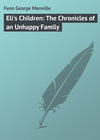Buch lesen: «Eli's Children: The Chronicles of an Unhappy Family», Seite 11
“Are you going to stay up long?” said Lord Artingale, gazing imploringly in Cynthia’s eyes.
“I don’t know, indeed,” she replied, pouting. “Papa has brought mamma to see a fresh physician, but is so cross and strange now. He has been reforming the parish, as he calls it.”
“Yes; so I heard,” said Lord Artingale, laughing.
“And that has meant quarrelling with all the stupid townspeople, and setting them against us.”
“Not against you, Cynthia,” said the young man in a low voice. “I don’t believe that.”
“Don’t talk nonsense, Harry,” she replied, laughing; “not now. But really it is very unpleasant, you know, for it makes papa so cross.”
“Of course it would,” said Lord Artingale, sympathisingly.
“And he talks about being so poor, and says that we shall all be ruined, and makes poor mamma miserable.”
“But he is not in want of money, is he?” cried the young man, eagerly.
“Nonsense! No: that’s how he always talks when Frank and Cyril are at home. Oh, Harry, I’m afraid they are dreadful boys.”
“Well, let’s try and make them better, eh, Cynthia?”
“I said you were not to talk nonsense now,” said Cynthia, shaking her pretty little head at him.
“Oh, murder!” he exclaimed, suddenly. “Hadn’t you better drive on? Here’s Perry-Morton.”
“No, no,” exclaimed the younger girl, “it would look so rude. You silly thing, don’t blush so,” she whispered to her sister; “it looks so strange.”
“Good-morning – ” said the subject of the thoughts of the group; and Mr Perry-Morton descended poetically upon them, for he did not seem to walk up like an ordinary being. “Cynthia,” he continued, with an air of affectionate solicitude, and leaving out the full-stops he had placed after his two first words, “you look too flushed this morning, my child. Julia, is not the morning charming? Did you notice the effect of light and shade across the water?”
Julia Mallow, who looked troubled and bored, replied that she had not.
“You observed it, of course, Mr Magnus?” continued the new-comer, with a sweet smile.
“No,” said the gentleman addressed, shortly. “I was talking to the ladies.”
“Ah! yes,” said Mr Perry-Morton, sweetly; and he held his head on one side, as if he were posing for a masculine Penseroso. “But Nature will appeal so to our inmost heart.”
“Yes, she’s a jolly nuisance sometimes,” said Lord Artingale, but only to evoke a pitying smile from Mr Perry-Morton, who, in spite of the decidedly annoyed looks of Cynthia and her lover, leaned his arm upon the carriage-door, and began talking to Julia, making James Magnus look like Harry Hotspur must have appeared when the “certain lord” came to him, holding the “pouncet box, which ever and anon he gave his nose.”
Cynthia Mallow made a pretty little grimace at Artingale, and, then turning with a smile to the worshipper of Nature, she stretched out her hand for the check-string so unmistakably that the gentlemen drew back, and raised their hats as the carriage rejoined the stream.
“Won’t you come and speak to the girls, Artingale?” said Mr Perry-Morton in a softly imploring tone; and suppressing a sigh of annoyance, the young man suffered himself to be led off with his unwilling friend, while the carriage went slowly on towards Kensington Gardens, stopping with the stream again and again.
“Julia,” cried Cynthia, flushing with annoyance, as soon as they were alone, “has papa gone mad?”
“Hush! the servants will hear you,” said her sister, reprovingly.
“I can’t help it, dear, it makes me so excited that I can’t bear it. How you can let that hateful creature come and patronise and monopolise, and seem to constrict you as he does, like a horrible short fat snake, I can’t imagine. Papa must be going mad to encourage it. If he were as rich as Cassius or Croesus, or whatever the man’s name was, it ought to be no excuse. I declare if you do not pluck up spirit and make a fight, I will. You can’t like him.”
“Oh, no,” cried her sister, with a look of revulsion.
“Then you must – you shall put a stop to his pretensions. Why, I declare to-day he behaved before Harry’s friend as if he were engaged to you. I felt as if I’d have given my pearls to have been at liberty to box his ears.”
“I think him detestable,” said Julia, sadly.
“Then you shall speak up, dear, or I will. I declare I’ll revolt, or no – Harry shall shoot him. I shall command him never to approach our presence again till he has rid society of that dreadful monster with his Nature worship and stuff. Good gracious, Julia, what is the matter?”
The carriage had stopped, as the younger sister prattled on, close by the railings near the Gardens, and Julia Mallow crouched shrinking in the carriage, gazing with a horrified, fascinated fixity of eye at the great half-gipsy-looking vagabond, who, with his folded arms resting upon one of the iron posts, and his bearded chin upon them, was staring at her in an insolent mocking fashion.
The spell only lasted for a few moments before the carriage went on, and with a low hysterical cry, Julia caught at her sister’s hand to whisper hoarsely —
“Oh, Cynthia, that dreadful man again!”
End of Volume One
Part 1, Chapter XX.
Jock Morrison’s Threat
The visit to town was but a flying one upon this occasion. The poverty at the rectory did not seem to be extreme, for the horses and carriage were sent up for the fortnight’s stay, and Mrs Mallow had her interview with the new specialist, who talked to her as some specialists do talk, and then she returned to the house taken for the short stay, and her girls had the use of the carriage.
It was a curious thing, and at first it had passed almost unnoticed, but just before the Mallows left the rectory, undergoing a process of smoking out, Frank and Cyril being the smoke producers, Jock Morrison, whose three months had been over now for some time, appeared once more in the neighbourhood of Lawford.
Julia and Cynthia met him one day by Tom Morrison’s cottage, leaning against the doorpost and talking to little Polly.
He had stared hard at them and then slouched away, Polly apologising for his presence.
“You see, Miss Julia, Miss Cynthia, he’s my husband’s own brother, and we don’t want him to feel that we turn our backs upon him.”
“No, of course not,” said Cynthia, “but I wish he would keep away;” and then they had a long chat with the little wife. She looked very pretty and pathetic in her deep mourning, and they parted very tenderly, Julia’s heart bleeding for the stricken woman.
“I’d have given anything to have asked her to show me where they buried poor baby,” said Cynthia, “but I dare not even allude to it.”
“No, of course not,” said Julia, with a shiver. “It was very sad; I can’t bear to think of it at all. Keep close to me, Cynthy,” she whispered.
They had suddenly come upon Jock Morrison, smoking his pipe as he sat upon a stile by the side of the lane, and as they passed he stared hard at Julia and laughed in a half-mocking way.
“How dare he stare at us like that!” said Cynthia haughtily, and then she began chatting about Polly Morrison’s trouble, and wishing that papa had not been so strict, and the meeting was forgotten till, three days later, when they reached London, and as they got out of the train, Julia started, for there, leaning against a barrier with his hands in his pockets, was Jock Morrison again.
The next day she saw him staring up at the house, and day after day afterwards she was sure to encounter his bold fierce gaze somewhere or another, till she grew quite nervous, telling her sister that she was certain that the mail was meditating some form of revenge against their father for sending him to prison.
“Nonsense!” cried Cynthia. “Papa is a magistrate, and he would not dare.”
Back at Lawford, and they were free of the incubus, in fact Jock Morrison passed out of mind; for in spite of his breathing out threatenings of poverty, the Reverend Eli Mallow, now that he found his eldest son had not come to him for money, had opened the rectory doors to receive visitors.
“We must entertain a little while we are down here, my dear, for the girls’ sake. Perhaps it is as well too for the boys.”
“Yes, dear,” said Mrs Mallow, looking up from her sofa with her customary patient smile; and the company arrived, and was entertained in a manner that made Fullerton hope that no one would suffer for it, that was all he could say.
Among the guests who had been staying at the rectory were the Perry-Mortons —the Perry-Mortons in society meaning Mr Perry-Morton and his two sisters, for though it was believed that they had, or had had, a father and mother, the seniors were never even heard of, much less seen. Ill-natured people said that Perry-Morton the elder had been a pawnbroker who had made money largely. Be that as it may, Perry-Morton the younger was very rich, and never mentioned any relatives but his sisters.
Lord Artingale was there from Gatton every day, but his friend and companion, James Magnus, was in the North sketching, so the young man, having no restraining arm on which to lean, fell more in love as fast as he could with little Cynthia.
Claudine Perry-Morton – by the way, there was a good deal of familiar nicknaming at the house of the Perry-Mortons, Mr Perry-Morton having been known to call Claudine – Bessy, and the younger sister – Faustine Judy. But that was in the privacy of their home life, and showed the simplicity and deep affection of their natures.
Claudine Perry-Morton had made a dead set at the young nobleman, but finding at once that her chance was nil, she graciously made way for her sister, who sang “Jock of Hazeldine” at him, in a very deep contralto voice, and with a graceful stoop over the piano; but Faustine Perry-Morton was woman of the world enough to see that Lord Artingale’s thoughts ran in quite another direction, so she also resigned herself to circumstances, and thought him a man of exceedingly low tastes.
So all the smiles and sweetness of the sisters were lavished upon the rectory girls for their brother’s sake. Nothing particular was said, but it soon became evident that Perry-Morton found favour with the Rector, and it was quite understood that the wealthy visitor would, sooner or later, propose for his elder daughter’s hand.
She was nearly as bright at this time as her sister, and Artingale declared that she was the dearest girl he knew, not from any amiable passages between them, but because she laughingly helped him to pleasant little tête-à-têtes with her sister, especially when they were out riding; horse exercise and good long gallops being a great deal in vogue, when the weather was mild and clear.
Lord Artingale would canter over from Gatton, sending two or three or more horses by his grooms, an arrangement highly approved of by Frank and Cyril Mallow, who were very civil to him, though in private they compared notes, and said that he would be an awful fool if he had not borne a title and kept such good cigars.
Sometimes the Rector joined the equestrian parties upon a quiet cob, but he generally turned homeward after two or three miles, either to make a call or two at the outlying farms, or to meet the carriage. Then, to make things pleasant, poor Julia talked art on horseback with Mr Perry-Morton, while her sister and Lord Artingale had a brisk canter over some heath, and the groom behind sat and grinned.
“Talk about the guv’nor,” said the last-named individual, as he returned to the stables with the horses, and compared notes with Lord Artingale’s man, “he is a sight on horseback. That there old cob holds him on almost. But if you want to see riding you should go behind that there Perry-Morton.”
This was in the midst of a chorus of hissing from the helpers, who were rubbing down the horses after one of the morning rides.
“He do look a rum un,” said one of the men.
“Look!” said the groom; “he is a rum un. He gets them little thin legs of his one on each side of the horse, and keeps yer altering his sterrups for ever so long. Now they’re too long, and now they’re too short, and when we starts he holds his reins one in each hand, and bends forward so that if his horse didn’t have on a martingale he’d always be finding his nose between its ears.”
“Can’t he ride, then?”
“Ride! Yes; like a sack o’ sharps on a miller’s pony. It’s freezing work going out with him, worse than with the guv’nor, for he keeps his ’oss at a walk the whole time. Lor’, I’d give something to see him on his lordship’s Mad Sal.”
But the groom was not destined to see Mr Perry-Morton upon that greyhound-framed hunter, which was full of fire and fidget with every one but Cynthia, who could have curbed her with a silken thread, for that gentleman was an admirer of repose even on horseback, and would only ride the quietest horse he could hire at the King’s Head, although Lord Artingale offered him the pick of his little stud.
Repose, too, gave him so many excellent opportunities for putting forward his suit with Julia, upon whom he beamed in a mezzo-tinto style, the lady hardly realising his meaning, only thinking him very absurd, and laughingly telling her sister that she owed her a long debt of gratitude for giving her so many opportunities for a long canter – one of those delightful long canters from which Cynthia used to come back with a delicious glow upon her cheeks, and with eyes that literally sparkled with health and pleasure combined.
“Looking like a wild gal,” Mr Jabez Fullerton said, as he stood at his shop door. “I declare it’s immoral, that’s what it is; a parson’s daughter gadding about like a jockey, Smithson; it’s disgusting.”
“Yes,” said Mr Smithson, who was calculating how many yards, at how much a yard, were in Cynthia’s well-fitting riding-habit.
“There’s a horse – look at it – for a young gal to ride! Well, all I can say is that I hope his lordship means to marry her. I never saw such goings on.”
“That there habit do fit well though, I must say that,” said Smithson.
“Fit?” said Fullerton. “Hah! The rectory’s a disgrace!”
But it so happened that riding was not always the order of the day. Long brisk walks were taken at times, much to the bemiring of Mr Perry-Morton’s patent leather shoes; and upon one of these occasions it had been arranged that Julia and Cynthia were to make a call or two upon some of the poor cottagers, who had been rather neglected during the past two weeks. Lord Artingale was going to ride over, and he and Mr Perry-Morton were to bring forward the ladies to meet them, if the Misses Perry-Morton could walk so far.
“Why, Julie, it’s quite a treat to be alone once more,” said Cynthia, merrily, as they walked briskly along the sandy lanes, calling at first one cottage and then another.
“Treat!” said her sister, smiling, “I thought – ”
“Hush! I won’t be teased. But, Julie dear, I won’t be a hypocrite to you. I do tease him and laugh at him, but he is nice, and I think I’m beginning to like him ever so.”
“I like him very, very much,” said Julia, naïvely. “He’s a very pleasant, manly fellow.”
“Yes, isn’t he, dear? But, Julie, it’s too bad, I know, of me to leave you so long with that dreadful bore. What does he say to you?”
“Say!” said Julia, with a smile; “really I hardly know. Talks about art and nature’s colour, and asks me if I do not find a want of thoroughness in our daily life.”
“Thoroughness! why that’s what his sisters are always talking about. I think it thorough nonsense. Oh, I shall be so glad when they’re gone.”
“Yes, it will be nicer,” said Julia, thoughtfully; “but papa seems to like them very much.”
“Yes, isn’t it extraordinary?” cried Cynthia. “He wants papa to take a house in town, and to furnish it upon plans designed by him. I heard them talking about it, and papa seems to be guided by him in everything. And what do you think?”
“I don’t know, dear.”
“I’m as good as certain that that wicked Cyril has been borrowing money of Perry-Morton.”
“Why do you think that?” said Julia, quickly.
“Because Cyril does not make fun of him a bit, but both he and Frank are wonderfully civil.”
Julia sighed.
“Hadn’t we better turn back now, dear?”
“Oh, no! let’s go as far as old Mrs Meadows’s, poor old lady; she’ll think we are never coming again.”
They walked a few hundred yards farther on, and sat for a quarter of an hour to learn how the poor old lady’s jyntes was uncommon painful just now, thanky, and that she hadn’t seen them since before Christmas, and that it had been the mildest Christmas she had knowed this sixty year; and then the old lady sent her visitors on their return walk, with the cheerful announcement that a green Christmas “allers made a full churchyard, my dears,” which well she knowed it to be true.
“Oh, what a dreadful old woman, Julie,” cried Cynthia, merrily.
“Poor old thing! but how well she is for eighty.”
“No troubles but her jyntes to harass her,” laughed Cynthia.
“How long will it be before we meet anybody?”
A much shorter time than they either of them anticipated, for as they turned a bend in the road, two rough-looking men who had been leaning against a gate came towards them, making no movement to let them pass, but staring offensively.
“Don’t be frightened, Julie,” whispered Cynthia, with spirit, “I’m not afraid.”
She walked on boldly, and darted such an imperious look at the lesser of the two men, that he slunk aside to let her pass, but the other, Jock Morrison, stood his ground. He stared in a peculiar, half-smiling way at Julia, making her shrink aside, and following her up, as, turning pale, her lips parting, and with dilated eyes, she felt as it were fascinated by his gaze, shuddering the next moment as he exclaimed with a coarse laugh —
“Bob, old matey, I mean to have this girl.”
Part 1, Chapter XXI.
At Kilby Farm
“Well – well – well – well,” said Mrs Portlock, folding her apron full of pleats, as Luke Ross sat talking to her for a while, and ended by telling her his intentions for the future. “Barrister, eh? Well, of all the trades I ever heard tell of – but can barristers make a living?”
“Yes, and a good one, too,” said Luke, laughing.
“Then you are not going to take to the school after all?”
“No, I have quite altered my plans, and I hope all will turn out for the best.”
“Ah, I hope so, I’m sure,” said Mrs Portlock, smoothing down her black silk dress, and then arranging a necklace of oblong amber beads, which she wore on market-days, one which bore a striking resemblance to a string of bilious beetles. “But what does your father say?”
“I have not told him my plans yet, for they have only been made since the governor’s meeting.”
“Well, Luke Ross,” said Mrs Portlock, in a resigned fashion, “I’m sure I don’t wish you any harm.”
“I’m sure you do not,” he said, laughing.
“Indeed I do not,” she continued: “but, for my part, I think you had a great deal better have kept to your father’s trade. Such a business as that is not to be picked up every day. But there, I suppose you know best.”
“Of course he does,” said the Churchwarden, who heard the latter part of her sentence. “You let Luke Ross alone for that. His head’s screwed on the right way.”
“Don’t be so foolish, Joseph,” cried Mrs Portlock. “Do talk sense. Has Mr Cyril Mallow gone?”
“Yes, he’s gone back home,” said the farmer.
“Why didn’t you ask him to stay and have a bit of dinner with us?”
“Because I didn’t want him, mother. He only walked home with me to ask about a bit o’ rabbit shooting.”
“But still, it would have been civil to ask him to stop. It’s market-day, and there’s the hare you shot on Friday, and a bit o’ sirloin.”
“Tchah! he wouldn’t have cared to stay. He dines late and fashionable-like at home.”
“I’ll be bound to say he’d have been very glad to stop,” said Mrs Portlock, bridling. “Fashionable, indeed! He got no fashionable dinners when he was working his way home at sea, nor yet when he was out in the bush.”
“Where he had much better have stayed – eh, Luke?” said the farmer. “He does no good but idle about here.”
“Idle, indeed!” cried Mrs Portlock, taking up the cudgels, rather indignantly, on the young man’s behalf. “It might be idling if it was Luke Ross here, but Mr Cyril Mallow’s a gentleman and a gentleman’s son, and he has a right to work when he likes and leave off when he likes.”
“Oh! has he?” said the Churchwarden, smiling at their visitor, as much as to say, ‘Now, just you listen.’ “Well, I’m not a learned man, like Luke Ross here, who has got his Bible at his tongue’s end.”
“As every man who calls himself a good man ought to,” said Mrs Portlock, tartly. “Sage!”
“Yes, aunt,” came from the next room, where the speaker could hear every word.
“Tell them to take the dinner in directly. And, for my part, Joseph, I think if you’d read your Bible a little more o’ Sundays you’d be a better man.”
“You wouldn’t like me so well if I was a better man, old lady,” he laughed; “but, as I was going to say, when I used to read of such things I got it into my head that the first specimen of a man as was made was a working man, to till the ground, and not idle and loaf about, and eat the fruit and shoot the rabbits in the Garden of Eden.”
“For shame, father, to talk in that way!” cried the lady. “And I wonder that you speak so disrespectfully of Mr Cyril Mallow. For my part, I think he’s a very nice, gentlemanly young fellow, and it’s too bad for people to be always sneering about him as they are.”
“And, for my part,” said the Churchwarden, good-humouredly, “I’m a bit of a Radical, and don’t believe in taking off your hat to a man because he happens to have a few thousand pounds more than one’s got oneself. If he’s a wonderful clever chap, with more brains than I’ve got, why, I do look up to him; but I’m not going down on my knees to a set of folks who yawn through their lives, doing nothing, except telling you by word and look that they are a better class of people than you are; and as for Master Cyril Mallow, he’s a well-built, strapping young fellow, who can talk well, and shoot well, but if he had happened to be my sod, instead of old Mallow’s, I’d have licked him into a different shape to what he’s in now, ay, and his brother too, or I’d have known the reason why. Dinner in, my lass? That’s well. Come along, Luke. Tchah! nonsense! you shall stay. You can tell the old man your reasons better when you’ve got a bit of roast beef under your waistcoat, and some of my ale. Why, Sage, lass, what ails you? Your face is as white as a bit o’ dough.”
“Oh, nothing, uncle, nothing,” she replied, forcing a smile, as she hurried to a tall press to get out a napkin for their visitor, and soon after they were seated at the hospitable meal, which was more bounteous on a market-day, the nearness of the farm to the town making it always probable that the Churchwarden might bring up a friend.
But Luke Ross was the only stranger on that occasion, and he sat opposite Sage, whose countenance, though less troubled than when she had overheard her uncle’s words, was lacking in its ordinary composure.
Luke saw this, and attributed it to their conversation, and the interest she took in his affairs. Her aunt saw it, too, and, with the idea of comforting her niece, kept turning the conversation to the Rector and his family, but not to do any good, for out of mere contrariety, and with a twinkle in his eye as he glanced at Luke, the Churchwarden set to and roundly abused the Rector and his sons for their ways.
“Come, Luke,” he said, “you are not making half a meal. I suppose by and by, sir, you will be as fashionable as Master Cyril Mallow, and won’t eat a bit at dinner-time without calling it lunch. Ha, ha, ha!”
“There, do have done, Joseph,” cried Mrs Portlock. “What have you got to laugh at now?”
“I was thinking of the horse-whipping I gave the young dogs – ay, it’s twelve or fourteen years ago now – that night I caught them in the orchard.”
“There, do let bygones be bygones, Joseph,” cried Mrs Portlock, sharply. “Boys will be boys. I’ll be bound to say you stole apples yourself when you were young.”
“Ay, that I did, and got thrashed for it, too. But I must say that Cyril Mallow don’t bear any malice for what I did.”
A regular duel was fought over that meal between the heads, Sage hardly raising her eyes, but looking more and more troubled as the Mallow attack and defence went on, while Luke Ross was so intent upon his own thoughts that he hardly heard a word.
It was with quite a feeling of relief, then, that Sage heard her uncle say —
“I like parson, not as a parson, but as a man: for the way in which he has tended that poor sick woman ’s an honour to him; but, as for his way of bringing up children, why, if I had carried on my farm in such a fashion I should have been in the Court o’ Bankruptcy years ago. Best thing Mallow could do would be to put the fellow with me to learn farming, and me have the right to do what I liked with him, and five-and-twenty to two? Is it, my dear? I didn’t know it was so late – and make us truly thankful, Amen.”
There was a general scrooping of chairs after this condensed grace, Sage hurrying off to put on her hat and jacket, and her aunt running after her to say, in a mysterious whispered confidence —
“Don’t you take any notice of uncle, my dear. He don’t mean half he says.”
“You’ll walk back with Sage, of course, Luke?” said the Churchwarden, quietly, as he drew his chair to the fire for his after-dinner pipe. “Well, my boy, I think you’re right about what you settled; but I suppose I had something to do with your altering your mind?”
“Yes, sir, I must own to that.”
“Well,” said the Churchwarden, thoughtfully, “I hope it’s for the best; I meant it to be. You’ll go back to London, then, soon?”
“Almost directly, sir, to begin working hard.”
“That’s right, my boy. I believe in work. Come over here whenever you are down at Lawford. I shall be very glad to see you, my lad, very.”
Then, pulling out his watch, he consulted it, and went on chatting for a few minutes as if to keep Luke from speaking about the subject near to his heart, but at last he broke in – “I need hardly say, sir, that I go meaning to work up to the point you named, and – ”
“Yes, yes, yes, my lad; let that rest. Let’s see how things go. You’re both young,” he cried, pulling out his big silver watch once more. “I say, mother,” he shouted, “tell Sage that Luke’s waiting to walk back with her. She’ll be late for school.”
Then like a chill to Luke Ross came back Mrs Portlock’s voice —
“Sage? Oh, she went out by the back way ten minutes ago.”




















